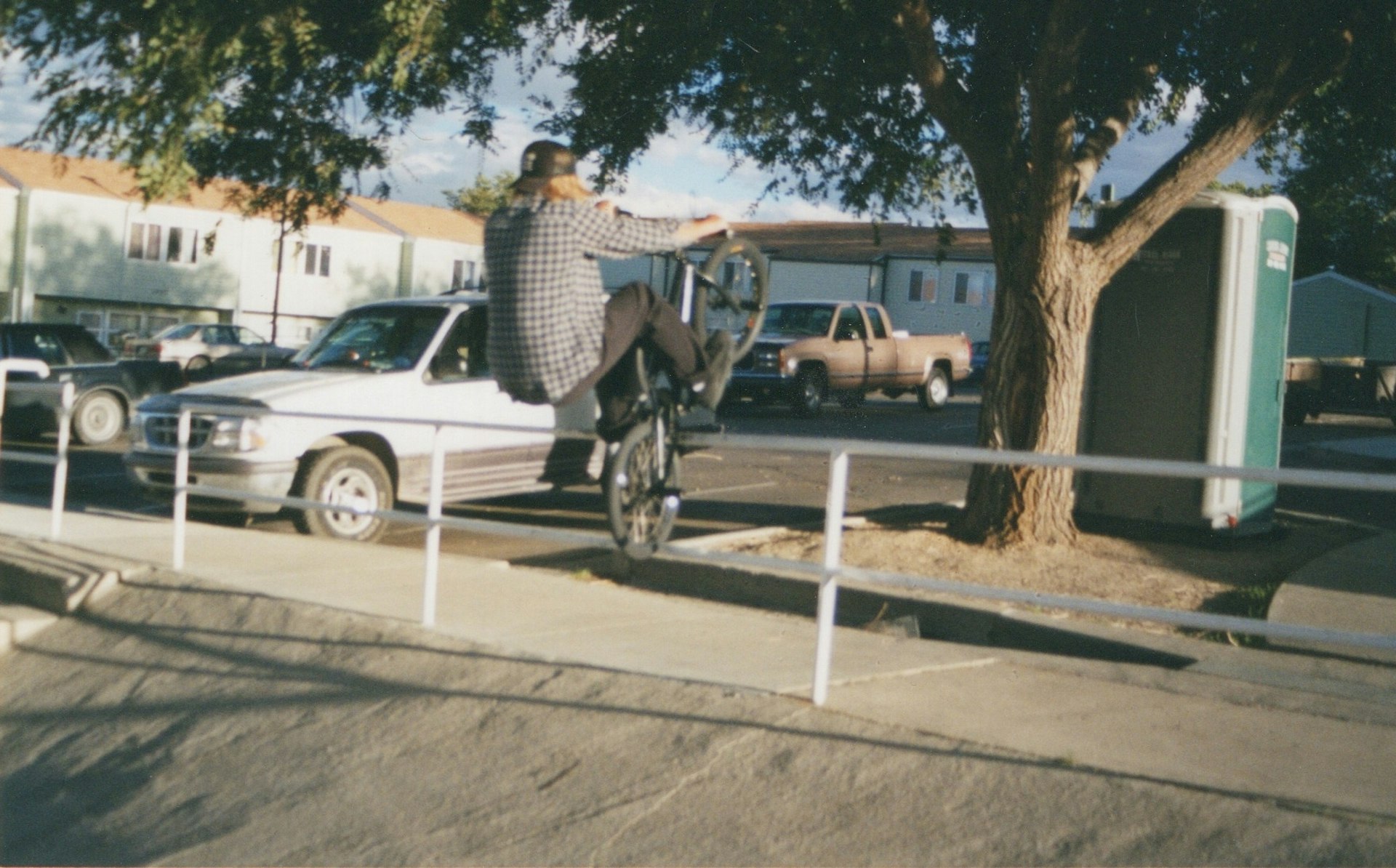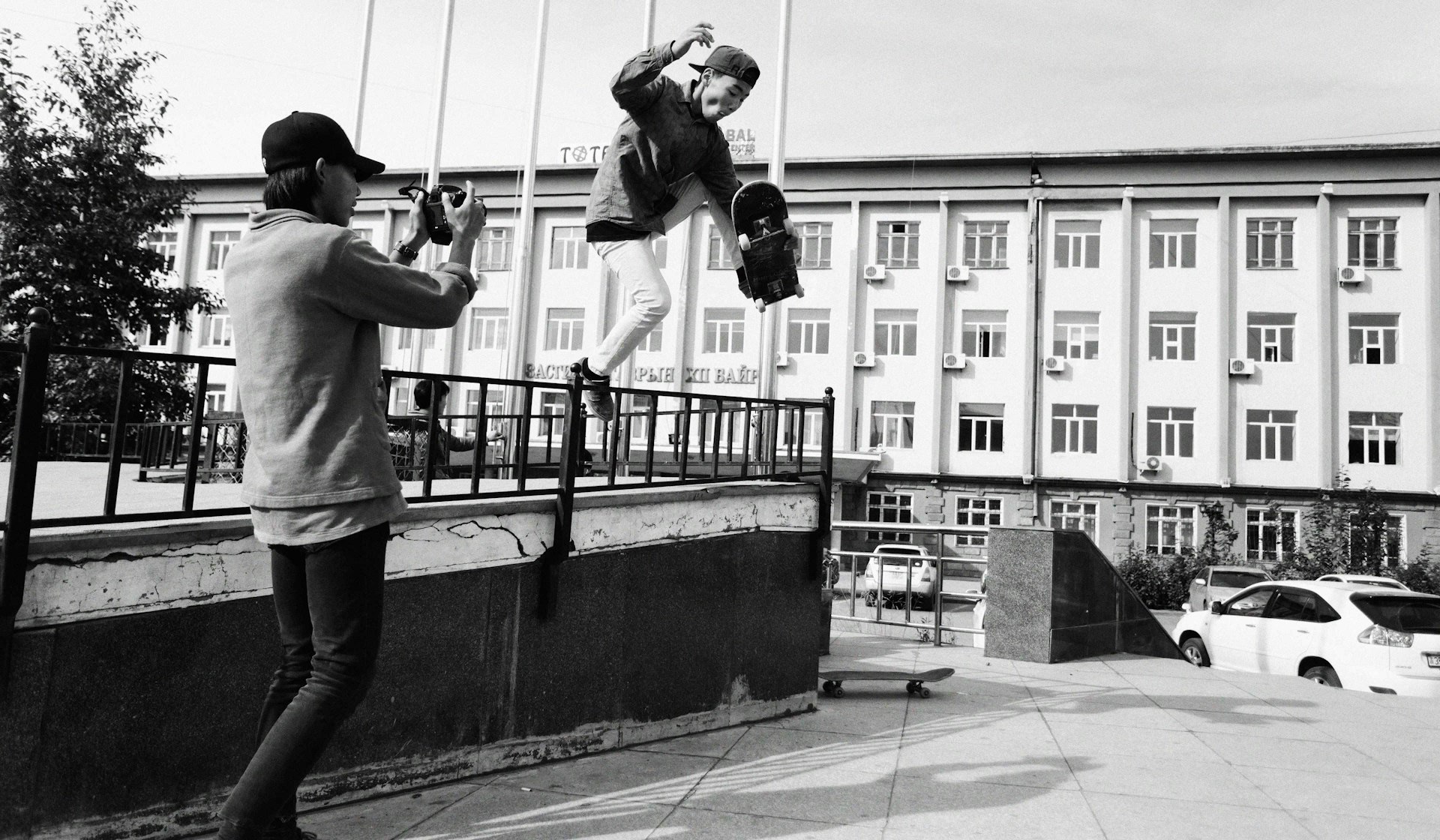
The Mongolians turning skateboarding dreams into a new scene in Ulaanbaatar
- Text by Bejan Siavoshy
- Photography by Bejan Siavoshy
Uukhai was the war-cry of Mongol warriors as they charged into battle, defying odds – and rival kingdoms – eight centuries ago. The incantation powered them to carve out the largest land empire in human history – spanning from the sea of Japan to Eastern Europe.
The battle cry has now been claimed by a new generation. Instead of tearing across the plains on horseback, they glide through the industrial urban sprawl of the Mongolian capital, Ulaanbaatar, on skateboards. In a country where half the population is under thirty, these skateboarders – members of the Uukhai skate crew – offer a glimpse at Mongolia’s rising creative class who take pride in their heritage, but are frustrated by the toll of the endemic corruption sowed by the generations before them. They’re a group that is misunderstood by their parents, but ready to start shaping the future.
This modern Uukhai has been loosely described as a skateboarding association. But its role and purpose varies, depending on which member you meet. For some it’s simply a crew of friends who skate together, for others it’s an NGO providing scarce skateboards to youth who can’t afford them; for some it’s street cool distilled and for others still it’s a feeling of freedom they cling to as expectations and economics yank at their feet.
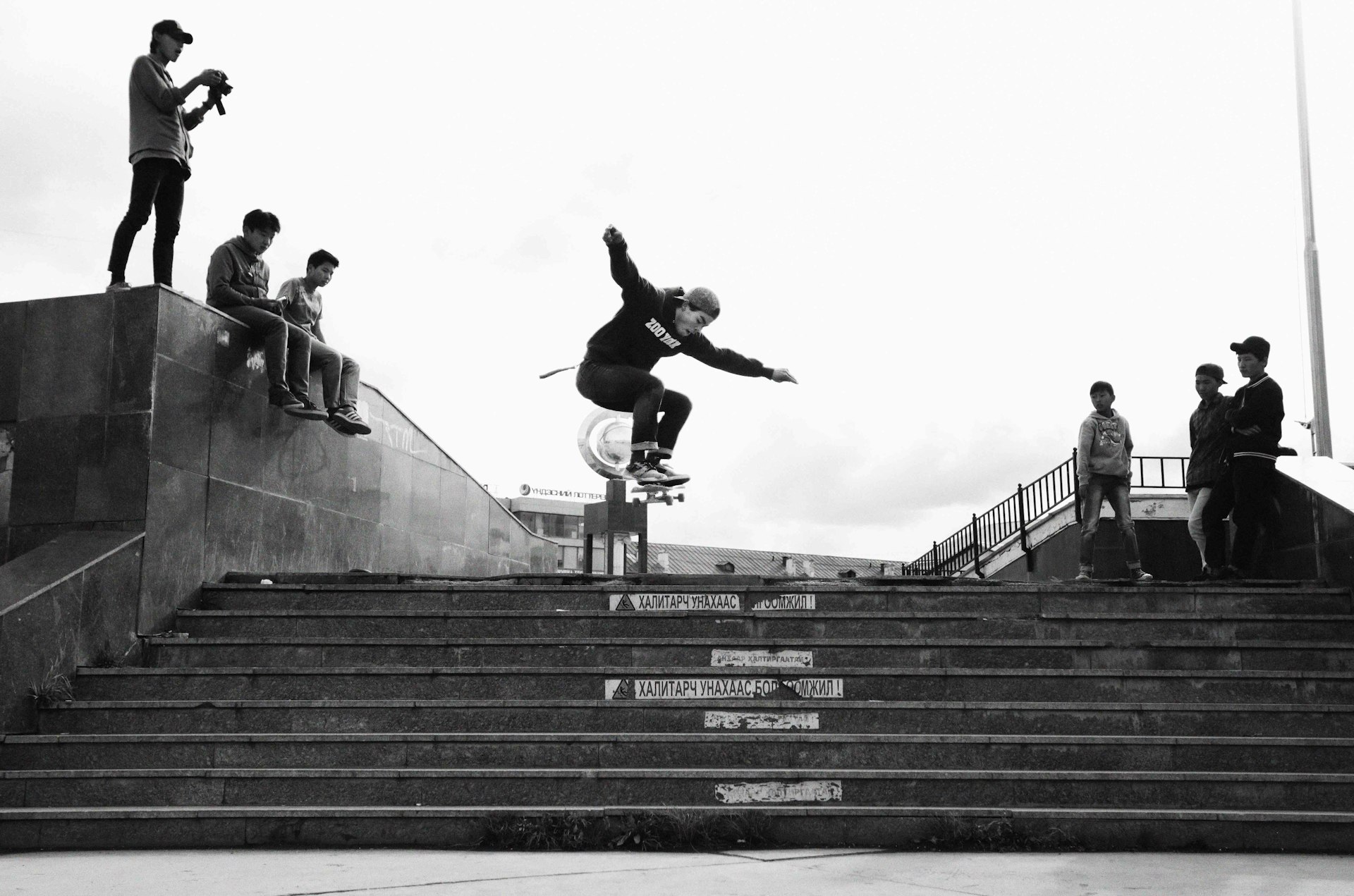
Erdenedalai ’Eddie’ Purev, Chef and Uukai founder, twenty-four
With both arms sleeved in tattoos and a head of hair that fades between long and short, Eddie is a walking poster-child for the culture he embraced as a bright-eyed thirteen-year-old, when he swapped Ulaanbaatar for Queens, New York — where he currently resides.
Eddie travelled between Mongolia and the US and started skateboarding in Ulaanbaatar in the mid-2000s without giving much thought to any broader movement. “Back then, I never really paid attention to the development [of skating in Ulaanbaatar]. Me and three friends were the only ones skating full time. We thought we were the only cool kids in town for sure.”
Over the years, his trips were notches in Mongolia’s shifting landscape as the country started adjusting to its free-market adolescence. After the collapse of the Soviet Union in 1989, and the youth-driven demonstrations that followed, Mongolia cast away nearly seven decades of communist rule. A democratic government and market-based economy was set up following the peaceful revolution of 1990, but political infighting, hyper-inflation and the 1997 Asian financial crisis meant Mongolia didn’t benefit from the transition until the mid-2000s.
“Things started to change as I got older and spent more time in Mongolia,” Eddie says. “Kids were always looking at me with awe, while I skated past them. I could tell they were brave enough to try it, but had no idea how to acquire a board. The streets were getting cleaned up, finally, so the opportunity was starting to shine.”
In 2013, Eddie started Uukhai. The potential he saw in the youth of Ulaanbaatar contrasted with the mismanagement he felt was becoming pervasive among the shot-callers of the new, moneyed Mongolia. “The elders were just putting money in their own pockets from all the mining opportunities,” Eddie explains. “I felt like making a difference that would directly influence the kids in the streets in an embracing, motivational way. What better way to do that than with what I love to do?”
After many late-night discussions, a lot of paperwork and politics, Eddie and his skate friends got Uukhai registered as an NGO. They set about raising money to get more skateboards to kids in Ulaanbaatar, and starting work on a video to give a voice to the local scene.
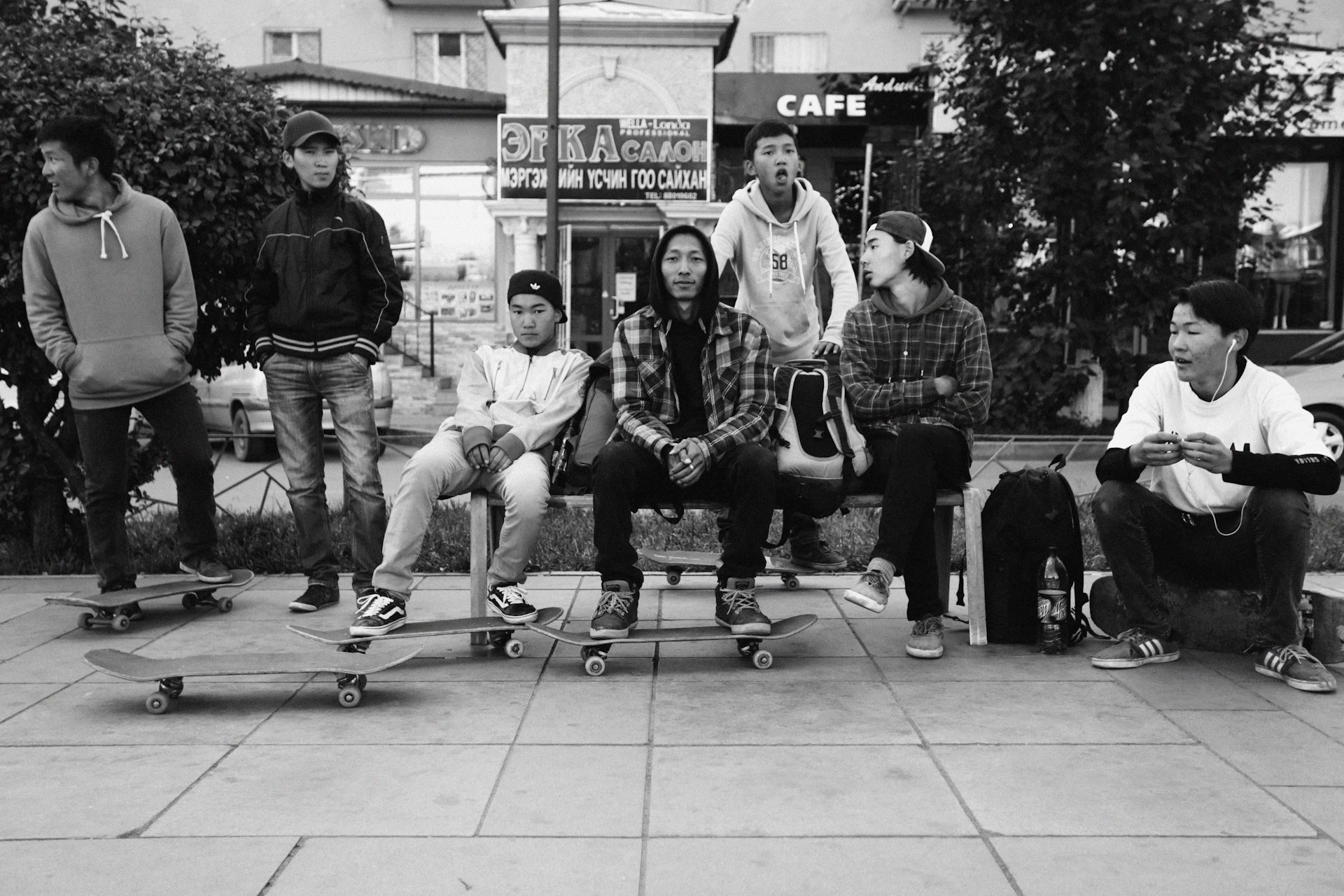
Tengis Badmaarag, fashion design student, eighteen
Tengis has been skating since he was fifteen at Fountain Park, a spot whose rebel credentials are marked by a monument to the Beatles. In 1970s Mongolia, the Beatles emerged as a symbol of rebellion as young people would gather to sing their tunes after buying albums at Ulaanbaatar’s black-market record-swap meets, shirking the censorship of the country’s then-communist government. One side of the statue sees the Fab Four cast in bronze against a red brick background; on the other side a young Mongolian is strumming a guitar against a block of solid yellow.
But even here skateboarding is far from universally appreciated. After landing a kickflip, Tengis is scolded by a white-haired woman for disturbing her tranquility. “They think a skateboard’s a toy,” Tengis says, nodding towards the elderly woman still casting a stoney look. “They think, ‘Oh, this is something for little kids to play with.’ Or they see us and think ‘These are bad guys,’ like gangsters. We tell them that we are just having fun and it’s a sport, but they don’t listen. They just say, ‘Don’t play with that toy here.’”
Here, in the park, Tengis first caught the eye of older skaters who would eventually go on to found Uukhai. But his parents have yet to be convinced that he’s not wasting his time. Their cynicism turned to condemnation when Tengis was hospitalised a year ago after attempting to jump a 1.6-metre gap and fell on his head. “I don’t remember much,” Tengis says. “My friends say I was knocked out for six minutes. After that my parents said, ‘You’re never skateboarding again.’ I told them ‘No, I want to be a pro skater.’ They just say, ‘Pfffft.’
Tengis insists he won’t bend to convention, but adds that a lot of skaters he grew up with have succumbed over the years, trading decks for jobs, and settling down to have families at the behest of their parents. “In the US or Europe, when kids are eighteen or nineteen, their parents let them go. Asian parents – even when you are old – they don’t let go,” says Tengis. “My father wants me to be an engineer. He is an electrical engineer, but I don’t like it.”
He studies fashion and hopes to make Uukhai into a homegrown skate brand. “I want it to have the feeling that it is a little old, but not too old. I want it to represent Mongolia and I want it to be a little gritty.”
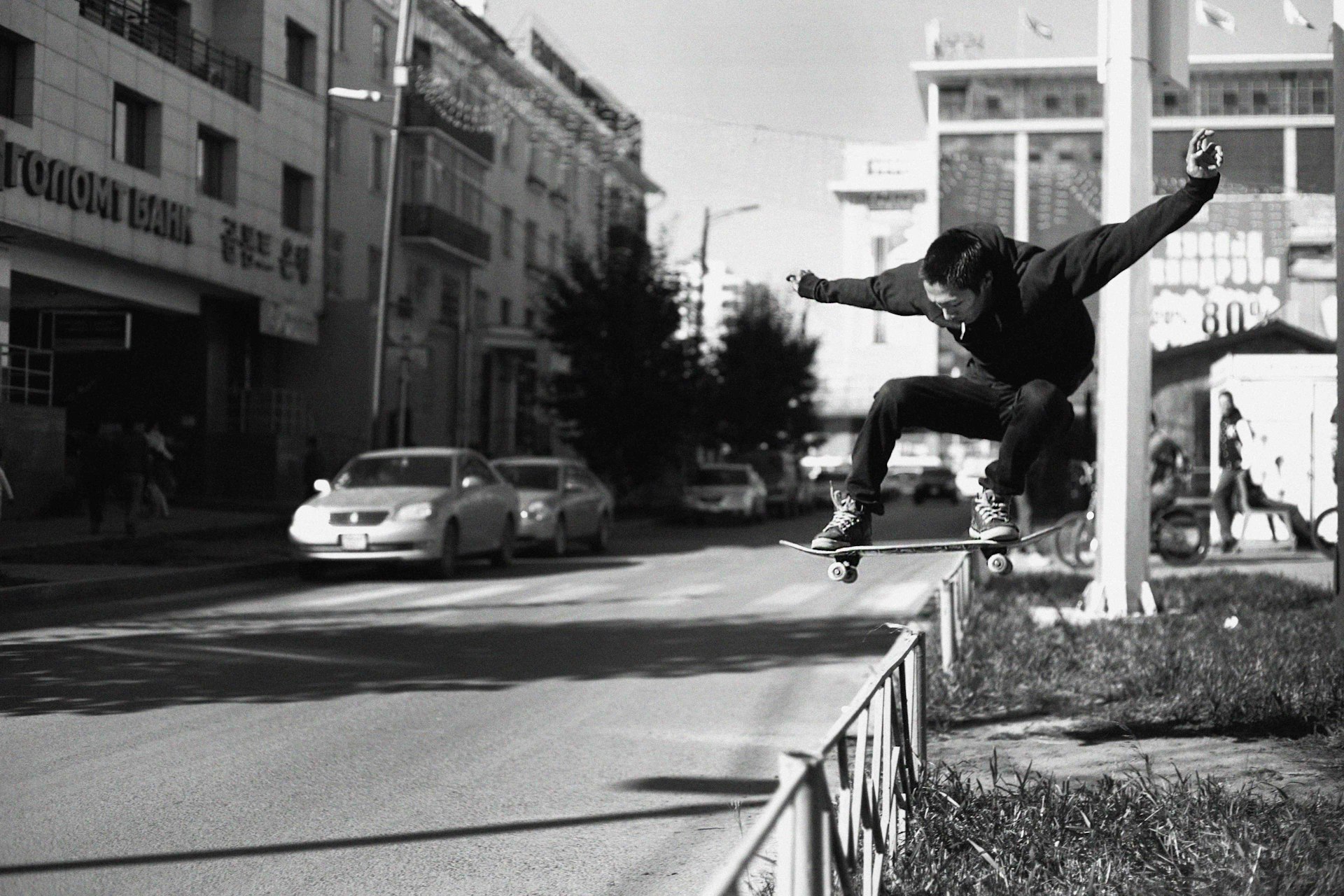
Sergelenbayar “Seke” Batjargal, aspiring skate shop owner, twenty-eight
In 2004, Carhartt’s skate team visited Mongolia and documented their journey through photobooks and videos. But it wasn’t until 2013, when Uukhai put out their own major video, The Uukhai Documentary, that the foreign perspective was countered by something truly authentic and homegrown.
One of the skaters in the video is Sergelenbayar Batjargal – Seke for short. The twenty-eight-year-old is often seen rolling around Fountain Park on chilly autumn weekends in a hoodie, jeans and scuffed skate shoes. Seke hangs at the sidelines during most skate sessions, letting younger kids get shine in front of their peers. But when he goes to try something, everyone stops to watch.
Today, Seke is fixated on a patch of grass that has created a five-foot gap between the park’s smooth concrete and the curb leading to the street – where he intends to land after jumping the grassy patch. Seven tries in, Seke sticks the landing. He hits it twice more, landing cleaner on try nine.
An eight-year veteran of Ulaanbaatar’s skate scene, Seke was there with Eddie at Uukhai’s inception. But Seke is in the minority among his peers; his parents support what he is doing with Uukhai and his ambitions to open the city’s first real skate shop. He wants to make skateboarding more accessible to Ulaanbaatar’s youth. At the moment, if you want a complete board from a reputable brand you have to buy it online for up to 250 US dollars – more than many parents want to spend on a “toy”.
Uukhai’s activities as an NGO tried to tackle this, but funding dried up shortly after their first fundraiser event. Seke says they’re still struggling to get financial or government support for skateboarding in the city.
“We haven’t met anyone interested in developing skateboarding in Mongolia,” says Seke. “They only see a few of us around the city skating and think it’s not popular. That’s why I want to open a skate shop. If I succeed, I’ll support skating for young people here. I give out my used decks in good condition to kids that need it. I gave away new bearings to someone last month. For now, I do what I can.”
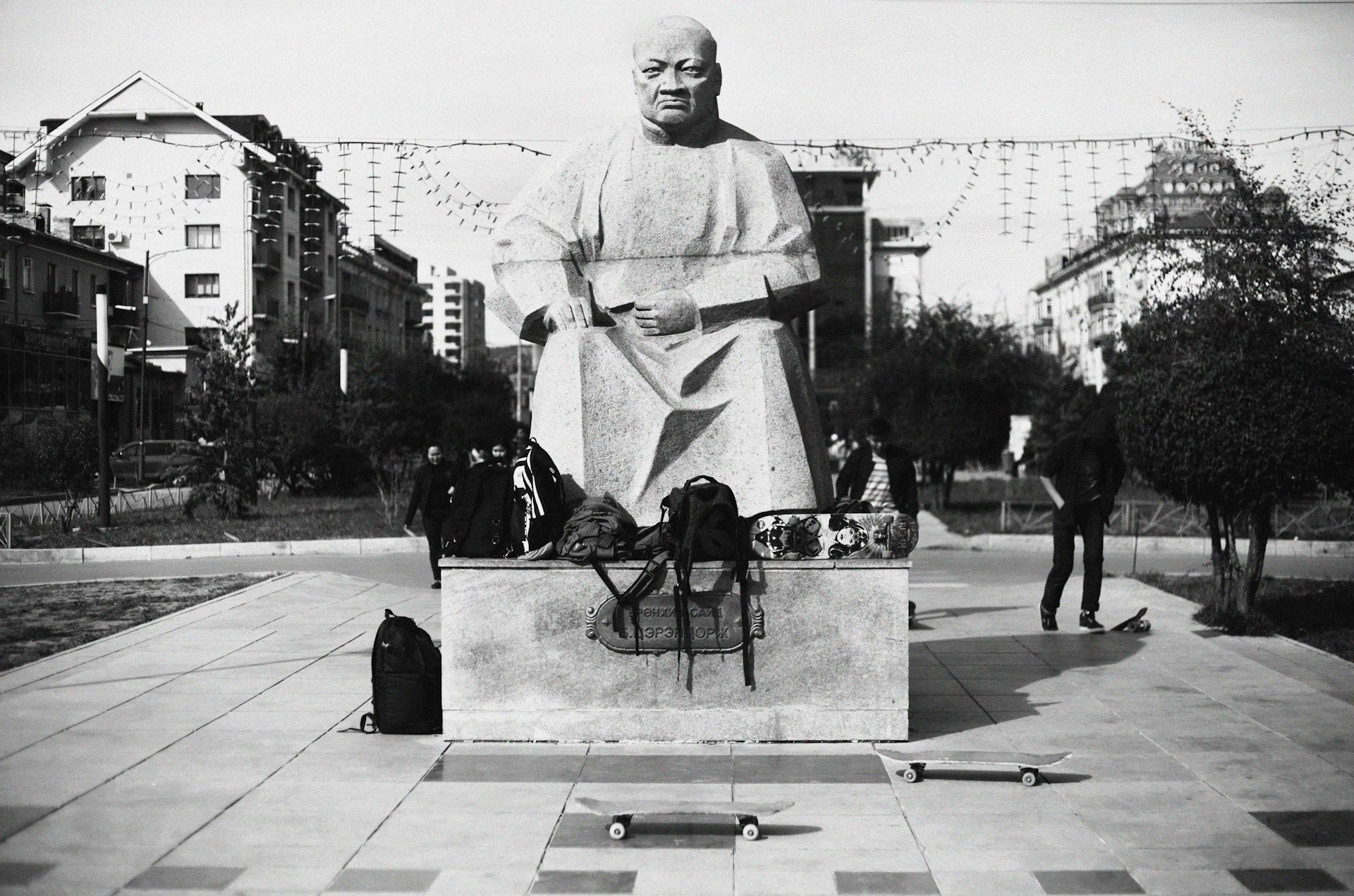
Ankhbayar “Patrik” Chinzorig, construction worker/bartender/student/Uukai skate manager, twenty
Ankhbayar Chinzorig, the Uukhai skate team manager is meeting friends in front of a clothing store, which boasts an open parking-lot and long rows of stairs.
Ankhbayar, who goes by Patrik, is late. Wearing a black beanie, workman’s jacket, and heavy boots, he looks ready for heavy lifting, not skating, when he arrives. He’s just finished his side-job on a construction site. Patrik trades boots for skate shoes with one of the younger skaters taking a break from the day’s action. As he warms up he cuts a different figure to the fresh-faced teenager that appeared in the 2013 Uukhai video. But after a few missed tricks, Patrik lands an ollie over a small ledge. “As I get older, my body is becoming heavier and stiffer, but it is probably because of my current job,” says Patrik. “I try to work out, practice and skate every day.”
Patrik works multiple side-jobs alongside bartending full-time and attending school. For him, working hard to follow his passion is not an issue; it’s the lack of support from the community that frustrates him. “People here think skating is not a serious sport. I’m working hard to show skating is a sport that should be taken seriously,” he says.
Uukhai have made headway in their quest to legitimise skateboarding. After approaching the local Ministry of Sports and Arts, the municipality agreed to help Uukhai organise an X Games-style competition in 2014, which was hosted at Ulaanbaatar’s National Amusement Park. But since then, Patrik says calls for government support have fallen on deaf ears – especially when it comes to helping build a park that’s skateable in winter, when temperatures can reach minus forty degrees Celsius. “We’ve proposed to the [local] government many times to build an indoor skatepark, but nobody would take it seriously. They think a skatepark is not a useful thing. Because of that, we skateboard in the street,” says Patrik.
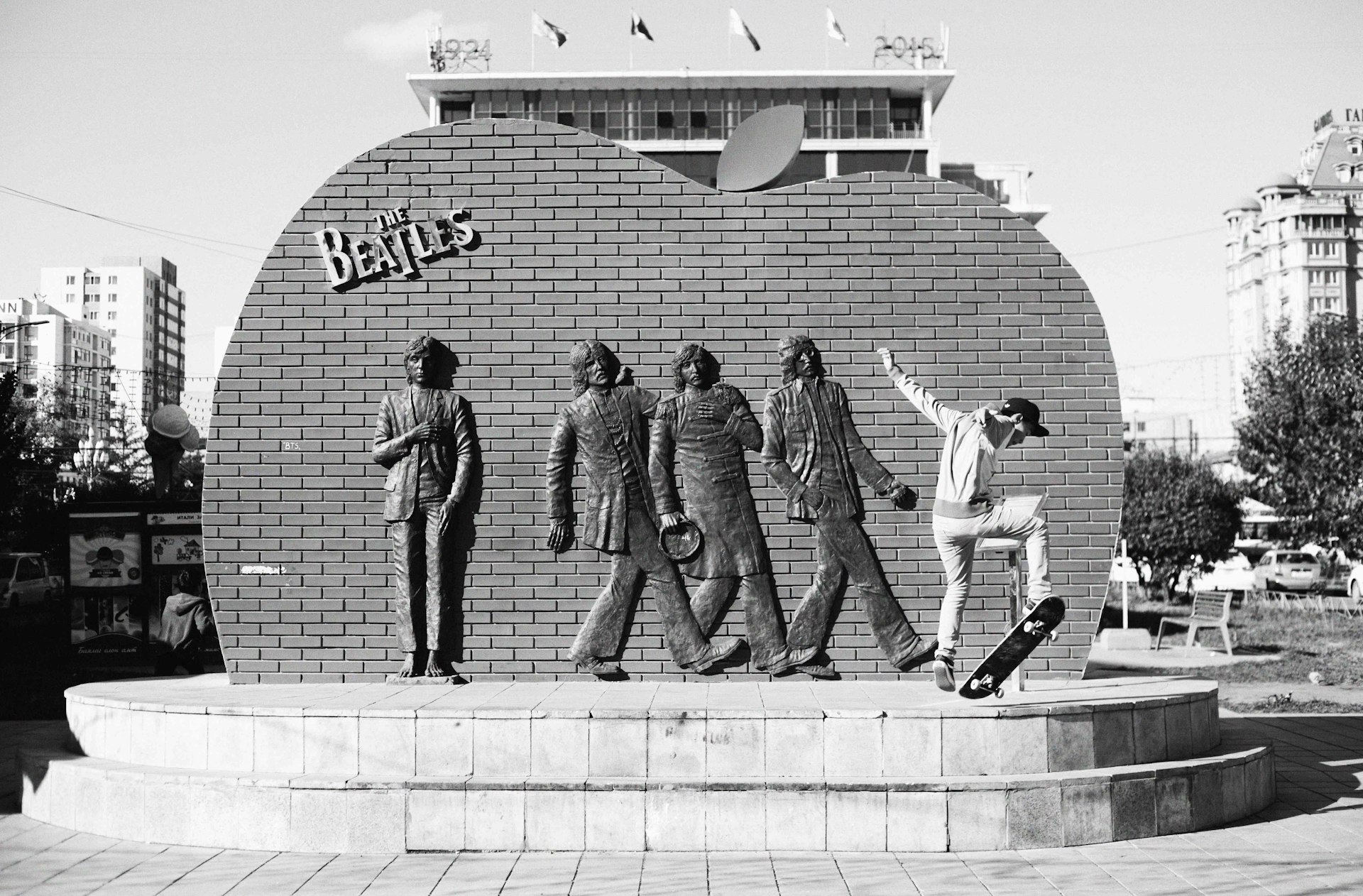
He also hints at a clash of ideologies between the older Mongolians that have known the nation as a Soviet satellite state, and the current generation, which knows Mongolia as a democracy. “Old people here are very conservative. They’re completely different from young people. Young people like to try out new things and are more open-minded. That’s probably because of the Old Russian socialist influence that has impacted [Mongolia’s older population] permanently,” Patrik says.
Distrust of the government is also growing in Mongolia, and Patrik says change is needed. His sentiments are shared by many, it seems: according to a 2015 Asia Foundation report, fifty-nine per cent of Mongolians believe corruption has gotten worse in the past three years, up from forty-one per cent in 2013.
But Patrik is hopeful: “I believe that the youth can make changes. When our generation reaches forty or fifty, I think Mongolia will be in a better place than nowadays.”
“Nothing is impossible,” adds Patrik, after another missed trick. A smile creeps across his face as he rolls away to try again
This article originally appeared in Huck 54 – The Defiance Issue. Grab a copy in the Huck Shop or subscribe today to make sure you don’t miss another issue.
Enjoyed this article? Like Huck on Facebook or follow us on Twitter.
